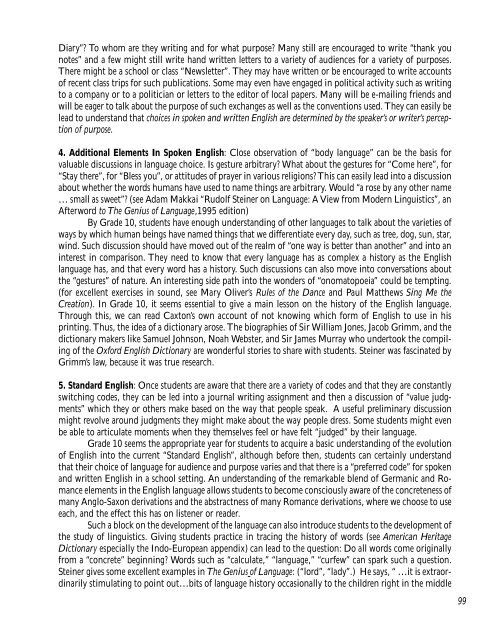Colloquium on English - Research Institute for Waldorf Education
Colloquium on English - Research Institute for Waldorf Education
Colloquium on English - Research Institute for Waldorf Education
You also want an ePaper? Increase the reach of your titles
YUMPU automatically turns print PDFs into web optimized ePapers that Google loves.
Diary”? To whom are they writing and <strong>for</strong> what purpose? Many still are encouraged to write “thank you<br />
notes” and a few might still write hand written letters to a variety of audiences <strong>for</strong> a variety of purposes.<br />
There might be a school or class “Newsletter”. They may have written or be encouraged to write accounts<br />
of recent class trips <strong>for</strong> such publicati<strong>on</strong>s. Some may even have engaged in political activity such as writing<br />
to a company or to a politician or letters to the editor of local papers. Many will be e-mailing friends and<br />
will be eager to talk about the purpose of such exchanges as well as the c<strong>on</strong>venti<strong>on</strong>s used. They can easily be<br />
lead to understand that choices in spoken and written <strong>English</strong> are determined by the speaker’s or writer’s percepti<strong>on</strong><br />
of purpose.<br />
4. Additi<strong>on</strong>al Elements In Spoken <strong>English</strong>: Close observati<strong>on</strong> of “body language” can be the basis <strong>for</strong><br />
valuable discussi<strong>on</strong>s in language choice. Is gesture arbitrary? What about the gestures <strong>for</strong> “Come here”, <strong>for</strong><br />
“Stay there”, <strong>for</strong> “Bless you”, or attitudes of prayer in various religi<strong>on</strong>s? This can easily lead into a discussi<strong>on</strong><br />
about whether the words humans have used to name things are arbitrary. Would “a rose by any other name<br />
… small as sweet”? (see Adam Makkai “Rudolf Steiner <strong>on</strong> Language: A View from Modern Linguistics”, an<br />
Afterword to The Genius of Language,1995 editi<strong>on</strong>)<br />
By Grade 10, students have enough understanding of other languages to talk about the varieties of<br />
ways by which human beings have named things that we differentiate every day, such as tree, dog, sun, star,<br />
wind. Such discussi<strong>on</strong> should have moved out of the realm of “<strong>on</strong>e way is better than another” and into an<br />
interest in comparis<strong>on</strong>. They need to know that every language has as complex a history as the <strong>English</strong><br />
language has, and that every word has a history. Such discussi<strong>on</strong>s can also move into c<strong>on</strong>versati<strong>on</strong>s about<br />
the “gestures” of nature. An interesting side path into the w<strong>on</strong>ders of “<strong>on</strong>omatopoeia” could be tempting.<br />
(<strong>for</strong> excellent exercises in sound, see Mary Oliver’s Rules of the Dance and Paul Matthews Sing Me the<br />
Creati<strong>on</strong>). In Grade 10, it seems essential to give a main less<strong>on</strong> <strong>on</strong> the history of the <strong>English</strong> language.<br />
Through this, we can read Caxt<strong>on</strong>’s own account of not knowing which <strong>for</strong>m of <strong>English</strong> to use in his<br />
printing. Thus, the idea of a dicti<strong>on</strong>ary arose. The biographies of Sir William J<strong>on</strong>es, Jacob Grimm, and the<br />
dicti<strong>on</strong>ary makers like Samuel Johns<strong>on</strong>, Noah Webster, and Sir James Murray who undertook the compiling<br />
of the Ox<strong>for</strong>d <strong>English</strong> Dicti<strong>on</strong>ary are w<strong>on</strong>derful stories to share with students. Steiner was fascinated by<br />
Grimm’s law, because it was true research.<br />
5. Standard <strong>English</strong>: Once students are aware that there are a variety of codes and that they are c<strong>on</strong>stantly<br />
switching codes, they can be led into a journal writing assignment and then a discussi<strong>on</strong> of “value judgments”<br />
which they or others make based <strong>on</strong> the way that people speak. A useful preliminary discussi<strong>on</strong><br />
might revolve around judgments they might make about the way people dress. Some students might even<br />
be able to articulate moments when they themselves feel or have felt “judged” by their language.<br />
Grade 10 seems the appropriate year <strong>for</strong> students to acquire a basic understanding of the evoluti<strong>on</strong><br />
of <strong>English</strong> into the current “Standard <strong>English</strong>”, although be<strong>for</strong>e then, students can certainly understand<br />
that their choice of language <strong>for</strong> audience and purpose varies and that there is a “preferred code” <strong>for</strong> spoken<br />
and written <strong>English</strong> in a school setting. An understanding of the remarkable blend of Germanic and Romance<br />
elements in the <strong>English</strong> language allows students to become c<strong>on</strong>sciously aware of the c<strong>on</strong>creteness of<br />
many Anglo-Sax<strong>on</strong> derivati<strong>on</strong>s and the abstractness of many Romance derivati<strong>on</strong>s, where we choose to use<br />
each, and the effect this has <strong>on</strong> listener or reader.<br />
Such a block <strong>on</strong> the development of the language can also introduce students to the development of<br />
the study of linguistics. Giving students practice in tracing the history of words (see American Heritage<br />
Dicti<strong>on</strong>ary especially the Indo-European appendix) can lead to the questi<strong>on</strong>: Do all words come originally<br />
from a “c<strong>on</strong>crete” beginning? Words such as “calculate,” “language,” “curfew” can spark such a questi<strong>on</strong>.<br />
Steiner gives some excellent examples in The Genius of Language: (“lord”, “lady”.) He says, “ …it is extraordinarily<br />
stimulating to point out…bits of language history occasi<strong>on</strong>ally to the children right in the middle<br />
99

















